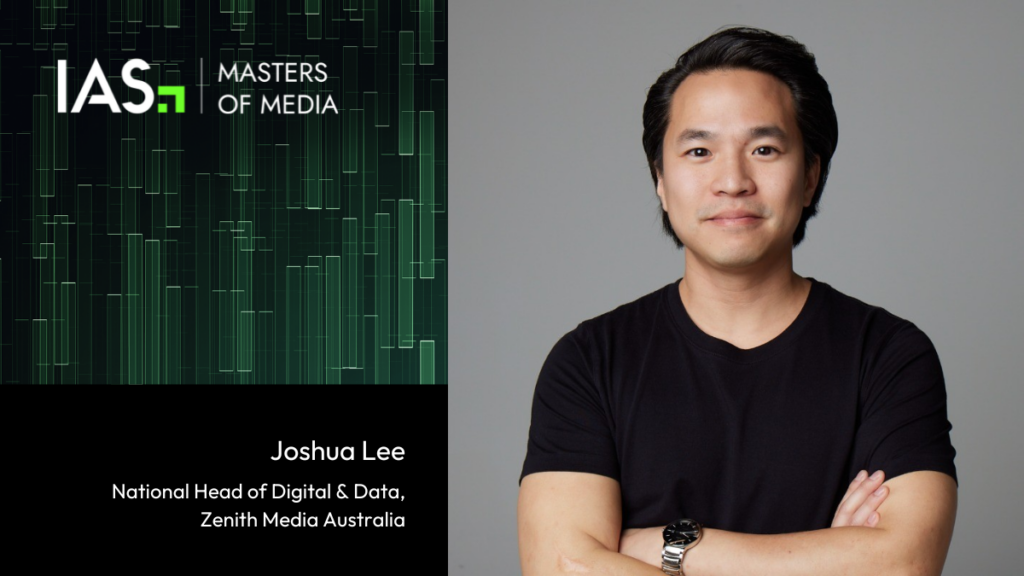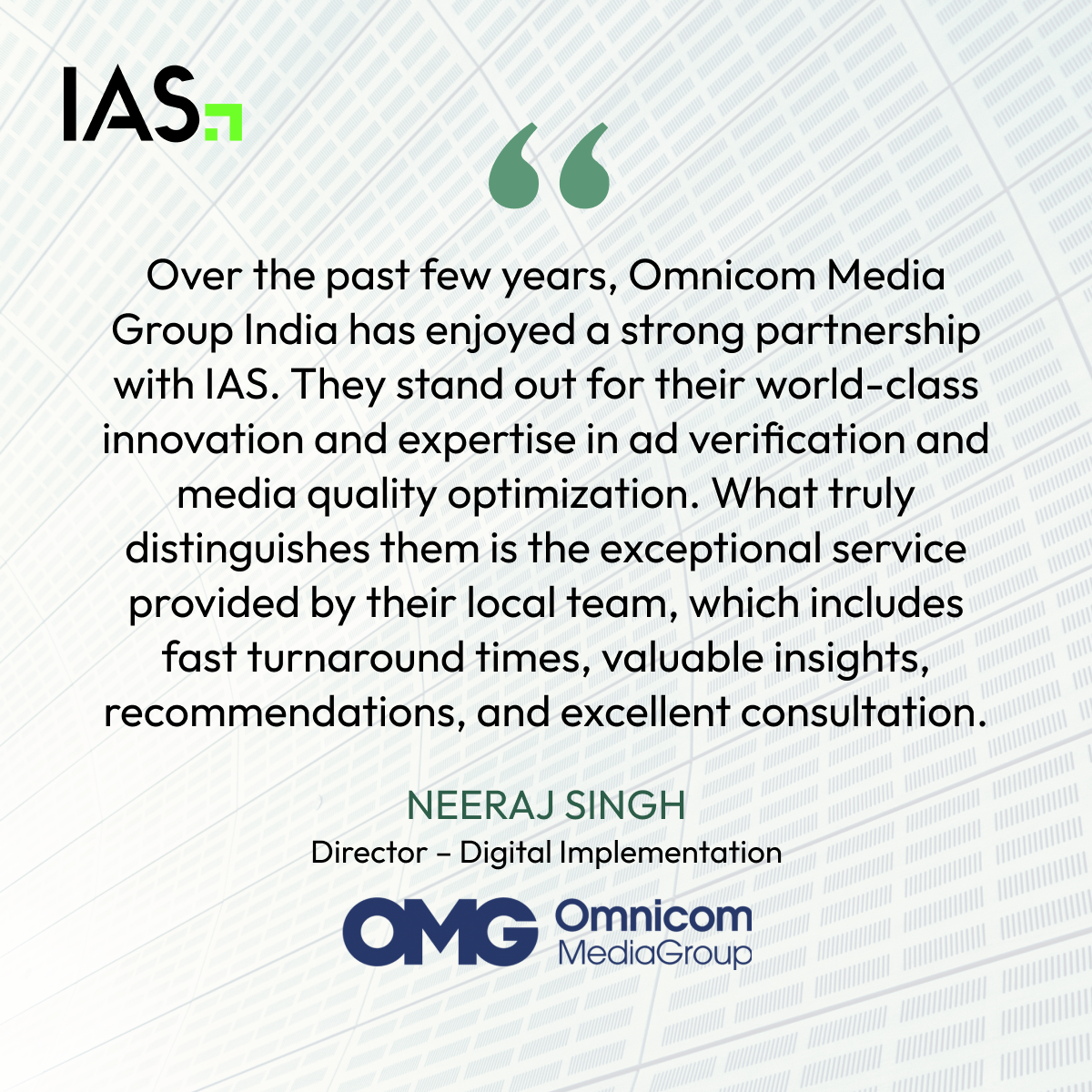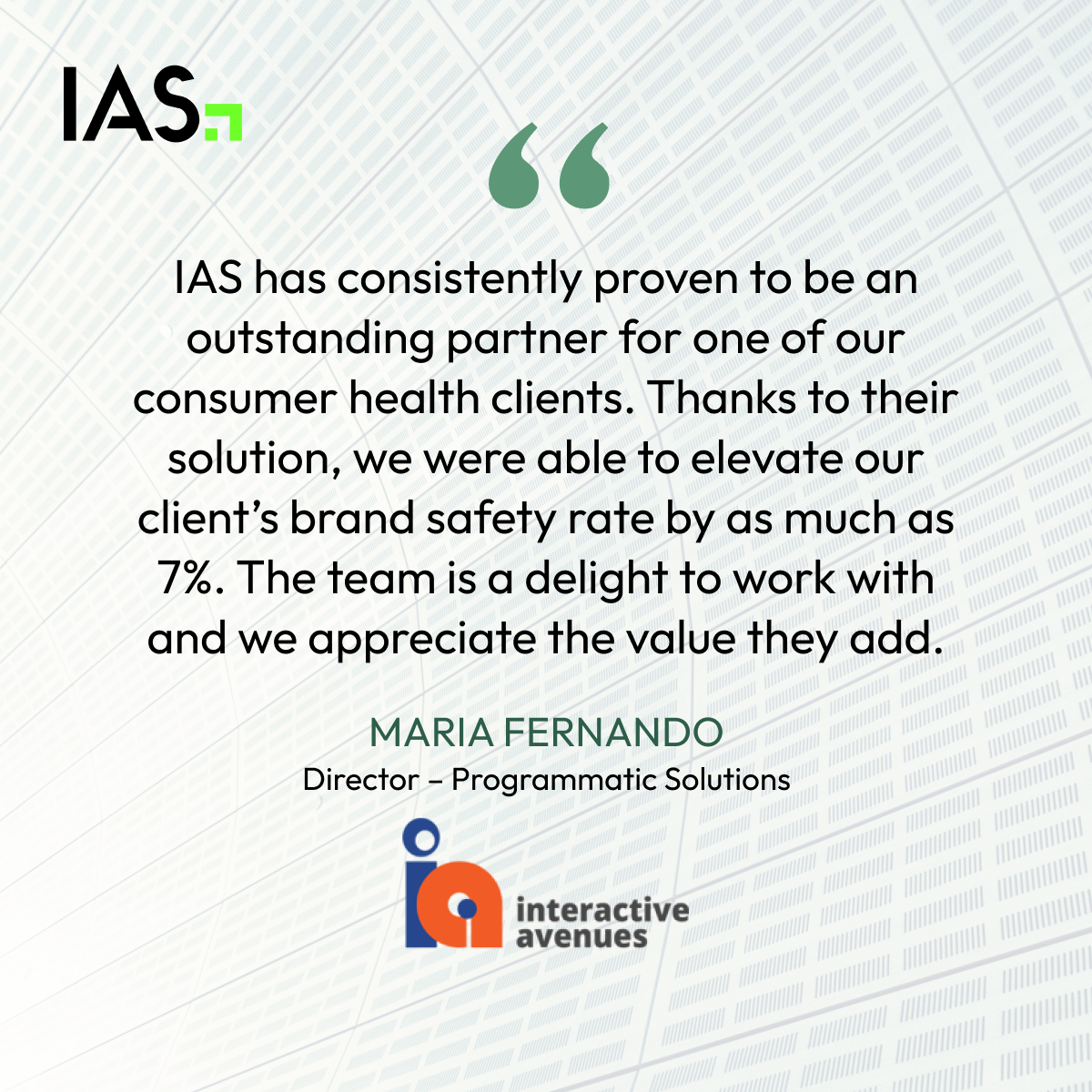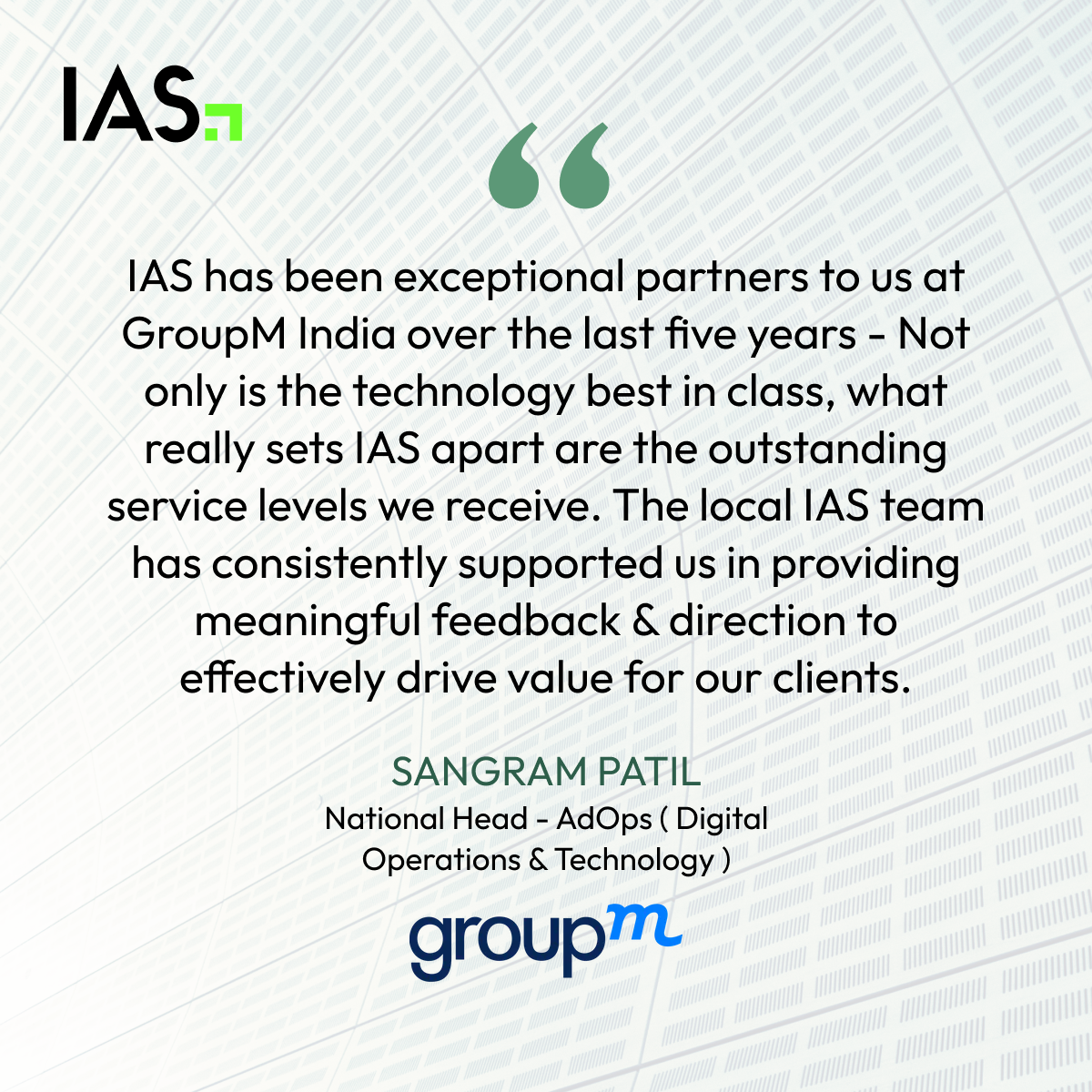
In this exclusive “Masters of Media” series, Integral Ad Science (IAS) speaks to the Movers and Shakers of the APAC advertising industry, on all matters digital.
Joshua Lee is the National Head of Digital & Data at Zenith Media Australia. He is responsible for leading the ongoing product development of Zenith’s specialist digital and data solutions whilst ensuring that they are constantly identifying commercial and innovation opportunities for their clients. Joshua has an extensive agency and digital background, five years in Head of Digital roles in Canada and Australia. Before joining Zenith, Joshua worked in digital and programmatic-focused roles, including Dentsu’s Group Investment Director role.
IAS: Please tell us about your digital advertising journey and your current role at Zenith media?
Joshua: Originally I wanted to get into creative advertising but fell into the digital media arm of Ogilvy Melbourne called Neo@Ogilvy. I was a Campaign Executive in a small team of 3 sitting adjacent to the TV production team. Still, amidst all the creative types and big TV spots, I was instantly hooked by the media’s analytical and data-driven side.
After 2.5 years at Neo@Ogilvy, I joined Media Contacts (Havas) as a Digital Executive and remembered gunning for a manager role but was told I wasn’t ready. It was the best thing for me as I still had a lot to learn about honing my craft, leading in all directions, and adding value to a team. Over four years, Media Contacts merged with its offline counterpart MPG and rebranded as Havas. Shortly after, we dropped the Havas name (ending its license agreement with Aegis Media) and merged with a digital creative agency (Rodeo), becoming a full-service agency called Huckleberry. By the end, I had worked my way up to Digital Director, grew my experience in digital planning, performance media, team management, and organisational change, and had a seat on the senior leadership team.
With programmatic on the rise and searching for a new challenge, I moved to Toronto, Canada, as Director of Client Services at Amnet (Dentsu’s trading desk), managing a team of 8. The experience taught me so much about adtech, data and the future of our industry. Then, focusing on integrating programmatic into traditional digital planning and buying, I was promoted to Senior Director of Programmatic and Digital Investments at Amplifi. A significant turning point in my career was when I left Amplifi and joined Zenith as their Head of Digital in Melbourne. The culture at Zenith was so down-to-earth and presented an excellent opportunity to return to digital strategy, planning and cross-channel buying.
In my current role as National Head of Digital & Data at Zenith, I am a member of our national Executive Leadership Team and responsible for driving our product and solutions, thought leadership, training and development initiatives and creating a connected national digital community. Looking back on 14 years, I am very fortunate to still work in the digital and agency side with some of the best people I know in the industry.
IAS: What are some key priorities for Australian brands during the upcoming holiday buying season?
Joshua: As e-commerce behaviours and online retail spending continue to grow, delivering a positive online shopping experience will be vital in reinforcing brand trust and loyalty. Furthermore, as many brands focus on accelerating their e-commerce roadmap, leveraging offline channels in the overall omnichannel experience will be critical. Therefore, one of the upcoming priorities will be striking the right balance between brand and performance spending.
As a competitive time of year, brands must also go the extra mile to cut through and increase the value exchange for consumer attention and share of wallet. For example, we will see greater use of shoppable video advertising and digital creative experiences offering entertainment or utility value that can inspire or help simplify the pressures of the holiday buying season. Immersive experiences that leverage AR can also be a great way to blend offline and online experiences to drive product discovery, engagement and buying consideration. As a result, these high-value exchange experiences will encourage users to share their data, allowing brands to build up their first-party data to drive more customer insights and deliver better personalisation.
IAS: If there’s one myth related to programmatic you’d like squashed, what would that be?
Joshua: Programmatic has come a long way in overcoming legacy myths such as cheap, low inventory quality and a performance media channel. However, I’d love to squash the myth that programmatic lacks creativity. In reality, programmatic is a significant enabler for delivering immersive and personalised experiences through innovations like dynamic creative, shoppable ad formats and high-impact rich media executions. Most people forget that programmatic is a data-driven method of reaching users at an individual level, at scale. However, the data behind it holds programmatic back from being able to deliver true personalisation.
Instead, the limitation originates from signal depreciation and our overreliance on third-party cookies, as they were never a stable identifier. When we can get to a place where we are leveraging persistent identifiers (at scale), this is where programmatic advertising will be able to fulfil its calling of mass personalisation through creative storytelling and experiences.
IAS: In your opinion, is the industry doing enough to combat the trust and transparency challenges in the digital supply chain?
Joshua: The programmatic supply chain has always been complex, and we have made much progress in bringing more trust and transparency to the fold. Some of those means include industry body whitepapers and guidelines, technical standards for authorised sellers, 3rd party ad verification SPO tools like Total Visibility by IAS and other reporting and buying controls within DSPs. Even Google has developed a new transparency tool, ‘Confirming Gross Revenue’, which is an excellent step in the right direction as it allows both publishers and buyers to verify that the full media spend reached its destination with no hidden fees taken along the way.
Unfortunately, due to the complexity, sometimes these means aren’t always fully exercised due to a lack of education, skills empowerment, and process reinforcement. As an industry, to ensure we can consistently build trust as the landscape evolves, we must pursue these three things to level-set comprehension and embed best practices into our culture and ways of working.
IAS: Any advice for leaders on talent retention and supporting a hybrid workforce?
Joshua: Due to the great resignation, we know the market has completely changed where salary expectations have inflated by up to 10-20%. In the short-term, this problem isn’t going away, and while salary is a crucial factor, it’s not the be-all-end-all as candidates are still looking for workplaces to meet their holistic life needs. For leaders, this means investing more into automation, training and development and connected experiences.
Automation tools will allow you to look at job descriptions differently regarding where to take out as many manual, repetitive and time-consuming tasks. This will free up capacity so staff can re-focus their energy on higher-value work, L&D and achieving work-life balance and purpose. Operationally, this requires time, effort and removing financial barriers, so it’s essential to be open to the available solutions in the market and bring staff along that journey for input, buy-in and visible progress.
Leaders must differentiate their training and development offering to attract new talent and provide long-term growth. For example, L&D is a passion of mine, and at Zenith, our insights showed that lack of training wasn’t the issue; it was more about the inability to navigate all of it. As a result, I lead ZenAcademy, our approach to simplify and personalise the media learning experience for junior staff. In 5 months, ZenAcademy has advanced 23 graduates, awarded 17 pay increases, fast-tracked 12 promotions, unlocked 47 industry certifications and amassed 750+ hours of training across digital, traditional, strategy, data & analytics and soft skills. As leaders, it’s our job to try and clear the path for staff to access relevant training and have a reasonable capacity to complete them so they can pursue the career pathways they are most passionate about.
Through Publicis Groupe’s flexible working framework, Publicis Liberté, we were already ahead of the curve in embracing flexible working before the pandemic. Now, it’s clear that remote working is here to stay, but working from home cannot replace the benefits you can get from being physically together, such as collaboration and improving staff happiness. Therefore, offering connected experiences prioritises quality over quantity, for example, initiatives that foster social interaction, ideas and knowledge exchange, staff recognition and reinforcing vision and values. Most companies have landed on a 2-3 day in-office expectation, so what you do on those days counts to driving culture and performance.
At Zenith, we’ve been fortunate to experience strong retention and happiness scores where we’ve placed #1 and #2 happiest agency in each market, as well as scoring well below the Media I industry benchmark for staff actively looking for a job in the next six months. However, achieving scores like these can’t be taken for granted. Leaders must have a feedback loop and consistently drive initiatives that close the gap between life experience expectations and their place of work.
IAS: Any advice for leaders to support equity in agencies?
Joshua: To me, equity means embracing and encouraging the diversity of backgrounds, skills, experiences and knowledge. At Zenith, we celebrate the diversity of our staff and strive to create an inclusive and equitable environment. Our agency has been working on embedding DE&I into our every day through education programs such as the SBS Inclusion training program (of which our agency had the highest national attendance across the entire industry) and Employee Resource Groups such as Viva Women and Égalité (LGBTQ+). My advice for leaders is to lead by example and ensure that what’s in their value statement and policies are consistently reflected on the floor regarding language, behaviours and action.
IAS: What’s your favourite book/podcast/movie and why?
Joshua: Barak Obama and Bruce Springsteen’s ‘Renegades Born in the USA’ is a favourite that got me into podcasts and through Melbourne’s lockdowns. For those who haven’t listened, it’s a 10-episode series of the two discussing their vastly different backgrounds but how they have commonality across music, fatherhood and enduring love for America despite its challenges. I found the conversations between the two fascinating as they grappled with America’s racial history and current political divisions. Right now, I’m thoroughly enjoying Simon Sinek’s podcast,’ A Bit of Optimism’, which he is using as a platform to connect with people who inspire him about life, love, leadership and silver linings.
IAS: What is your advice to the fresh talent in the industry?
Joshua: Whilst it can be tempting to gravitate to digital, which is growing the most and dominates how we consume media, do not forget other channels will continue to make up the total media mix. So, lean in and learn about the other side of the fence to start your career with a strong foundation that will round out your overall skills, as this will make you indispensable and open more career pathways in the long run.
Understandably, everyone is motivated by that first promotion, but it’s also crucial to remember that cultivating long-term skills and a solid reputation will propel you further. As a fresh talent, you are a dry sponge, so learn as much as you can and while it is tempting, try not to constantly compare yourself to others as this will only eat away your self-esteem. Instead, compete with yourself and seek ways to add value so that when new opportunities arise, you will be prepared with the right skills and resilience to take on increased responsibility and workload pressures without getting caught in the trap of over-extending yourself by a shiny title or salary.
 Share on LinkedIn
Share on LinkedIn Share on X
Share on X

